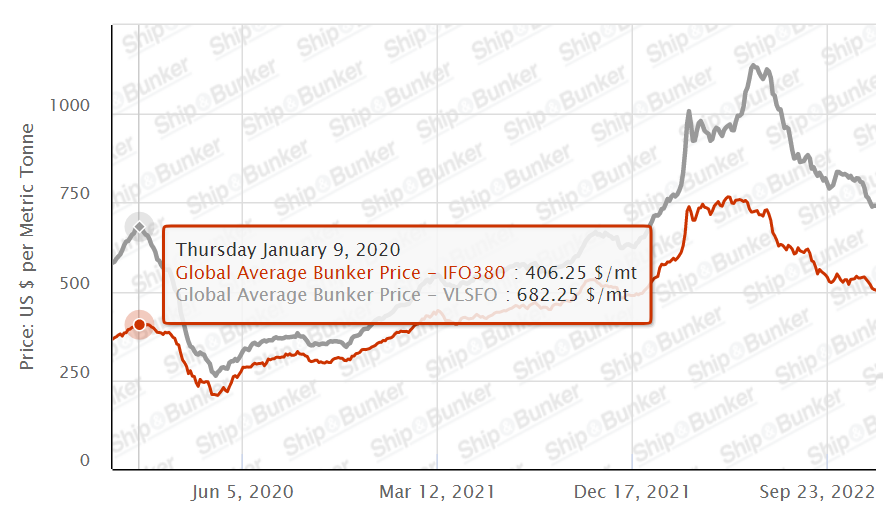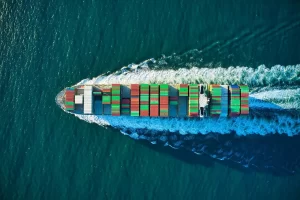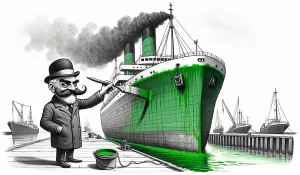Apologies to Salt-n-Pepa for hijacking their hit single, but let’s talk about SOx.
Sulfur Oxides, or SOx, is a family of chemical compounds containing sulfur and oxygen molecules. These compounds are produced as by-products of the combustion process when a fuel is burned that contains sulfur, such as those typically used in marine diesel engines. Greenhouse gases (GHG) like carbon dioxide (CO2) and methane are also by-products of fossil fuel combustion, but SOx is not typically considered a GHG. Short-term exposure to SOX emissions is harmful to the human respiratory system and not only makes breathing difficult but can also lead to premature deaths, especially for people with asthma. SOx emissions also contribute to particulate matter pollution and acid rain which is harmful for ecosystems. Needless to say we should be limiting it as much as possible.
SOx Mitigation
SOx emissions can be mitigated in two ways. One option is to treat the exhaust gas and filter out the compound. Such systems are called exhaust gas scrubbers (or simply ‘scrubbers’), they use water to remove sulfur compounds and can be open loop or closed loop systems. A second option is to burn a marine fuel that contains less (or no) sulfur.
The harmful effects of SOx are well-established and fortunately maritime regulations are in-place to limit these emissions. As recently as January 2020 a global limit on the sulfur content of marine fuels came into force, colloquially known as ‘IMO 2020’ or the ‘Global Sulfur Cap’. This rule limits the sulfur content in marine fuel oil to a maximum of 0.50% by mass, a significant reduction from the prior limit of 3.5%. Certain regions of the world, known as emission control areas (ECAs) have even stricter limits, only allowing fuels with no more than 0.10% sulfur by mass.
Faced with this regulation, vessel owners and operators had to make a choice: keep using relatively cheap fuels with high sulfur content and install an exhaust gas scrubber system, or use low sulfur fuels. Fuels with less sulfur include: Very Low Sulfur Fuel Oil (VLSFO) (less than 0.5% sulfur); Ultra Low Sulfur Fuel Oil (ULSFO) (less than 0.1% sulfur); marine diesel oil (MDO); and Marine gas oil (MGO), a blend of HFO or VLFSO and MDO. Yet, these fuels have historically cost more than heavy fuel oil (HFO). For example, on January 9, 2020 the average global cost of HFO was $406 per metric ton, whereas the average global cost of VLSFO was $682 per metric ton, a 68% mark-up. The differential between these two fuels is referred to as the hi-5 spread.
Scrubber or VLSFO?
In January 2020, the cost of installing a scrubber system was quoted at between $1 million and $5 million dollars, and it’s still approximately the same today. If a vessel uses approximately 125 tons of VLSFO or HFO a day and operates 250 days a year, a $5 million scrubber installation would have a payback period of approximately one year, assuming a hi-5 spread greater than $150 per ton and all else being equal. As the spread narrows, the choice between the two options becomes less obvious
Using scrubbers as a sulfur mitigation strategy favors vessels with regular operating schedules and which consume large amounts of fuel, such as big container ships. For example, as of June 2022, approximately 19% of all container ships are fitted with scrubbers, and 13% of all tankers and bulk carriers. Drilling down on container ships, according to Clarksons data, 46% of container ships with capacity greater than 8,000 TEUs have scrubbers and 59% of ships with capacity of 12,000 TEUs or larger.

In the years since the Sulfur Cap came into effect, the hi-5 spread has ebbed and flowed, ranging from $50 to $200. Today the spread is around $250 on average, due in part to the conflict in Ukraine which has disrupted global energy markets. At the moment, those companies that went with scrubbers are feeling good about their decision and seeing better performance in stock markets due to higher net-profits relative to their competitors that are paying record high prices for VLSFO.
If the hi-5 spread remains high, it incentivizes vessel owners and operators to choose scrubbers on new ship constructions, thereby locking-in continued use of HFO for years to come. Moreover, it is the largest ships that use the most fuel, and thus have the highest emissions, that are most likely to use scrubbers. To make matters even worse, scrubbers may actually increase fuel consumption leading to even more greenhouse gas emissions.
Scrubbers: Good for SOx, Bad for Climate Change
Regardless of whether vessel owners and operators choose VLSFO or HFO with a scrubber, both are bad with respect to carbon dioxide (CO2) emissions. According to research performed by the ICCT, average CO2 emissions were 4% higher using HFO with a scrubber compared with MGO. Worse, black carbon emissions using HFO with a scrubber were expected to be 350% higher than using MGO. We need cleaner fuels.
Elise Sturrup, an Associate Researcher at the ICCT tells The Liquid Grid, “when the choice of burning cleaner fuels is there, it is disheartening to see so many ships being installed with scrubbers. Engines burning HFO with scrubbers are worse than using MGO with respect to air pollutants such as CO2, PM, and BC.”
The 2020 IMO Sulfur Cap provided a much needed regulation in global SOx emissions from vessels. However, the use of scrubbers as a mitigation strategy is slowing the transition towards low- and zero-carbon fuels like methanol and ammonia, both of which could offer lower SOx emissions and reduced carbon dioxide emissions. The continued use of scrubbers perpetuates the status quo of using HFO instead of pushing the maritime industry towards cleaner alternative fuels. While the scrubbers might limit SOx emissions today, they are preventing climate progress tomorrow.

Let’s talk about SOx, Baby
Oh, oooh, ooooh, oooh ah (Mmmmh hmmm)
Oh, oooh, ooooh, oooh ah (Ooops)
Oh, oooh, ooooh, oooh ah (Ah ha)
Oh, oooh, ooooh, oooh ah
Come on!
… Let’s talk about SOx, baby
Let’s talk about ports and ships
Let’s talk about all the good things
And the bad air that may be
… Let’s talk about SOx
Let’s talk about SOx
Let’s talk about SOx
Let’s talk about SOx
… Let’s talk about SOx for now
To the people on ships or in the port
It keeps coming out the pipe
Don’t be coy, avoid, or make void the topic
Cuz that ain’t gonna stop it
Now we talk about SOx at the I-M-O and M-E-P-C
But fossil fuels are too easy
… Let’s tell it how it is, and how it could be
How it was, and of course, how it should be
Those who think it’s dirty, have a choice
Install the scrubber, closed loop, or open loop, no discharge
Will that stop the climate? Nope
… All right then, switch fuels!
Let’s talk about SOx, baby
Let’s talk about ships and ports
Let’s talk about all the good things
And the bad air that may be
… Let’s talk about SOx
Let’s talk about SOx (A little less, a little less)
Let’s talk about SOx
Let’s talk about SOx
…Out the stack, SOx makes me want to cough
Respiratory illnesses ain’t no thing to scoff
Heavy fuels rule, but burning them only leads to death
Clean fuels are better, hell, I’d like to save my breath
…Old residual, heavy fuel oil
Scrubbers just enable this status quo, yo
Which means that we need to say no,
But methanol and ammonia can still move our cargo
…Sulfur Cap is good
We have that Very Low Sulfur Fuel
But I think it’s cruel
To use this gruel
When we know climate change is real, we shouldn’t be fools
… Instead of scrubbers, focus on clean fuels at scale
Man, old fossil fuels are just pale
Compared to zero G-H-G
The time has come, our climate needs it more than ever
Please know, that its got to be our one biggest lever
… Let’s talk about SOx, baby (no more)
Let’s talk about you and me
Let’s talk about all the good things
And the bad air that may be
… Let’s talk about SOx (no more)
Let’s talk about SOx (kill it)
Let’s talk about SOx (uh-huh)
Let’s talk about SOx




